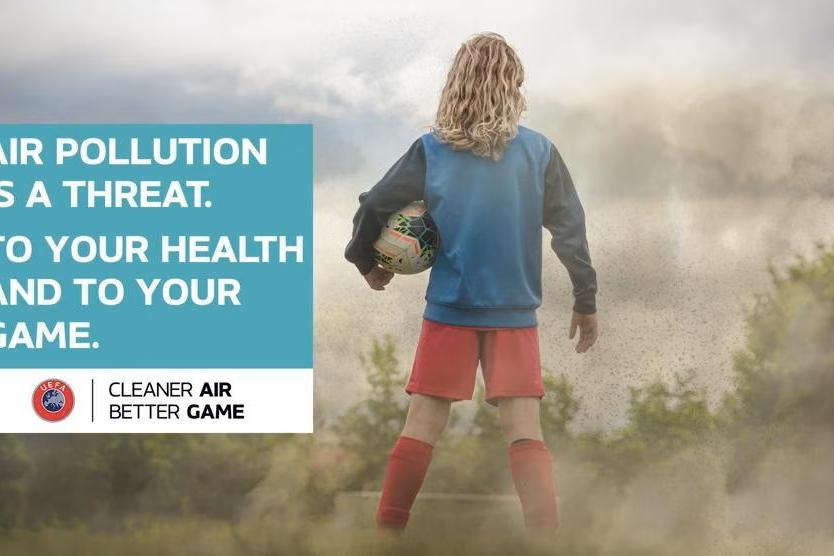PHOTO
For the Under 21 European Championships, scheduled to take place on Romania and Georgia from 21 June until 8 July, UEFA has reproposed its 'Cleaner Air, Better Game' campaign. The initiative, that first appeared in the last Under-21 tournament, aims to raise public awareness on the damaging effects of air pollution on individuals' health, that according to the WHO (World Health Organization) kills over seven million people a year.
Poor air quality also has a negative effect on footballers' health, with studies showing that higher levels of air pollution can slow the tempo of a game down by up to 15%.
The 'Cleaner Air, Better Game' campaign carries out a vital role in promoting a collective effort in monitoring and trying to reduce carbon emissions during the Under-21 Euros. From national federations and players to fans, volunteers and workers, all interested parties are encouraged to adopt environmental practices through a series of initiatives that will be organised by the host cities. These initiatives will be revolved around waste management, cleaning measures adopted by local communities and plans for sustainable travel to/from stadiums. Through the campaign, UEFA is not only sending out a strong message to the footballing community, that a cleaner future is desirable, but that it is achievable with the actions and hard work of everybody.
"We don't inherit the planet from our ancestors, but temporarily hold it for our future children," said UEFA president, Aleksander Čeferin. "Therefore, we need to leave it in the best possible condition. We must work smarter because research data shows that the siutation is alarming. We will use the powerful voice of Football to raise awareness about this issue and suggest creative and fun solutions to change things for the better."
"I invite everyone who has football in their heart to take part in the 'Cleaner Air, Better Game' campaign, and I'm not only referring to those who'll be in Georgia and Romania for the tournament," Čeferin followed up. "Looking after and improving the quality of the air we breathe is a global objective, that we can only achieve as a team. In the end, it is our choices and actions that make the difference, not our skill and talent."
For the duration of the Euros, UEFA, along with the Georgian and Romanian federations, will prioritise environmental, social and governance principles in the event's operations, in line with the strategic approach outlined for the tournament. On the environment front, the organisers will conduct analysis on how fans move around during the competition, closely monitoring the carbon emissions produced; reduce generators used for TV broadcasting to a minimum, and introduce separate bins and containers for recycling waste.
UEFA and footballing local federations will also organise a workshop on climate during the tournament to share best practices and develop innovative solutions for reducing carbon emissions. The workshop will be a platform for dialogue and collaboration on environmental matters in Football.
Finally, the host nations will give priority to governance in pushing UEFA's sustainable strategies and practices by publishing them in the local language, conducting consultation with stakeholders, providing educational courses to workers and volunteers about ESG matters (Environment, Social and Governance), launching a communication campaign to raise public awareness about air pollution, and declaring its performances based on ESG parameters.
The campaign has also received support from the European Commission. Frans Timmermans (Executive vice-president) and Virginijus Sinkevičius (Environmental, Oceans and Fishiing commissioner) have praised the initiatives to promote environmental awareness. " We hope that UEFA's campaign on clean air in the world of professional football is an inspiration for many others to take action against the climate crisis," said Timmermans. "Millions of Europeans love football, love watching it and love playing it. Regardless of whether we are playing with a ball on the street or on a football pitch, everyone deserves to breathe clean air. Just as for players and fans, also our individual choices can make a massive difference, such as choosing to travel to the stadium that respects the environment."
The Georgian and Romanian football federations have also given their support to the campaign, underlining the potential outreach of the competition to raise public awareness on the importance of conversation about climate conservation. "This important, football tournament is an excellent opportunity to demonstrate the hard work needed for the protection and sustainability of our environment," Levan Kobiashvili, president of the Georgian Football Federation (GFF), said.
"Through the 'Cleaner Air, Better Game' campaign, we want to grab people's attention on the importance of each individual's role in the collective and demonstrate what football's contribution is in protecting the environment," said Romania's Football Federation (FRF) president, Răzvan Burleanu. "I invite everyone to take part in the project, not only as a simple spectator but as an active and fully aware participant, that understands the benefit for the good of future generations."
In December 2020, the UEFA president signed a European Pact on Climate, committing world Football to raise public awareness of the emergency climate, and to inspire more people to help in saving the planet. Furthermore, UEFA also declared its responsibility in reducing carbon emission in its UNFCCC Sports for Climate Action framework last year.
